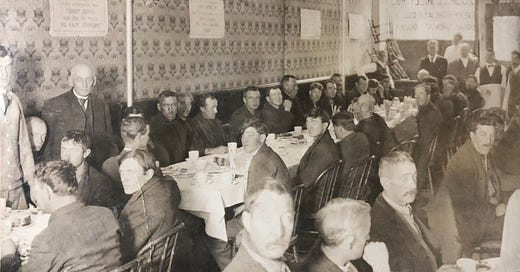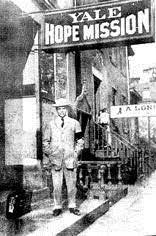When Dr. Henry W. Frost asked a well-traveled foreign visitor, “What has impressed you most since you came to America?”, without hesitation came the reply:
“The sight of that young millionaire kneeling with his arm around a ‘bum’ in the Yale Hope Mission.”
Even as he prepared to depart for the foreign field, Borden kept up his visits to the Yale Hope Mission through all his other engagements, and made provision, financially, for its being carried on under the care of Mr. Shelton of the National Bible Institute.
111 years ago this month (December, 1912) Borden managed to get down to New Haven one more time, giving a (final) Sunday evening to the dear old work. His love for it was just the same as when he had gone into it with all the hopes and fears of a beginner, six years previously.
For those who have not yet read Borden of Yale, the remainder of this article comes from Chapter 12, which is all about the founding of Yale Hope Mission and the fruit it bore:
New Haven, a seaport town midway between New York and Boston, was a place where vagrants of all sorts were apt to congregate. Work was to be had on the docks, and it was a halfway house for tramps and hobos moving from one city to the other. It was also the location of the county jail, from which prisoners were constantly being discharged with no one to give them a helping hand. Although drinking saloons and infamous resorts were to be found in abundance, there was no rescue mission with its doors always open to those who needed help.
To his mother Borden wrote on November 1, 1906:
“John Magee…had me up in his room today to talk about the need for a good City Mission here in New Haven.
The plan was to get a suitable building in the down-town district and have a real Rescue Mission, run by a man from Water Street, or some such (degenerate) place, and a few hand picked men from the University…It would be great to take a few skeptics down and let them see the Spirit of God really at work regenerating men.”
And in another letter exactly one week later, he continued:
“Last night I went over and saw Magee. Mr. Skinner and old Brother Martin (converted drunkards) met with us, and we talked over plans for the City Mission. I tell you it was inspiring to hear those men talk! We decided to pray over the matter for a week and see what would develop. I hope to go to the prison with them a week from Sunday. They go once a month. The prospects for the Mission are very bright, and I feel sure we shall have it, if it is the Lord’s will.”
The plans they had for the rescue work soon took shape as the Yale Hope Mission. Much hope and prayer lay behind the modest beginning, of which Borden's good friend Charlie Campbell wrote:
“A room had been rented in a cheap hotel in just the right quarter – the room that has been used ever since for the meetings. It had hideous dark-red paper in those days. Later on, Bill bought the entire building, and we now have downstairs dormitories and shower baths, and a place in which clothes can be fumigated, as well as a good, inexpensive lodging house upstairs, known as the Hotel Martin. For two dollars a week a man can have a room to himself, a little home.
But we had no such help in those early days and did more ourselves in consequence. I can remember distinctly how we carted hymn books in my suitcase down to the hall for that first meeting. The handle of the suitcase broke, and we had to hoist it up on our shoulders and carry it through the streets!
Bill was heart and soul in it all. It was great to see him in those meetings – so earnest in his presentation of the truth and in dealing with those who came forward for prayer. Afterwards, he would often take men around until he could find a place for them to sleep, and pay the lodging-house charge himself so as to avoid putting temptation in their way by giving them money.”
Here is a lengthy (yet very insightful) testimony from one of Yale Hope Mission’s early converts:
“I came in here…on a drunk and hadn’t much use for religion. I’m not going to tell the worst part of my life, but I was a rambler all right – a down-and-out bum. There were only three states in the Union I hadn’t been in. I had heard of the Mission, same as a good many of them do. I knew it was the only thing that would save me from booze.
That night Bill was here, and he spoke to me. He always believed in getting right down and talking to a man. If Bill had anything to say he gave it right out. He would tell you to hope again; he would tell you of the God who’d made the universe and held you in the hollow of His hand and could help you if you’d only ask. That’s the way he talked. He was one good boy. I could never forget him as long as I breathe – no, I never forget him. And he was barely twenty that night I first met him!
I went forward and kneeled down and Bill came and kneeled down beside me, and he explained as much as he could the power of Jesus Christ, and how it was only Him who could help me. I never drank from that night to this, never felt like it – never felt like it, from that day to this – and before that I was drunk most of the time. I had been drunk just about all that winter.
Well, after I was converted I came every night – didn’t miss a night after that for seven weeks. It’s all fresh in my mind still. [Later] I was baptized and joined the church. If Bill hadn’t opened this Mission I’d have been dead. Not till the books of heaven are opened will you know what Bill Borden did by opening Yale Hope Mission.
I never knew a feller just like Bill. I’d like to get a hold of one of his pictures. Seems to me if I saw one, I’d almost try to steal it. I never knew a feller like him. He was a gentleman in every sense of the word, and a Christian through and through. That was first and last in his life. The way he came amongst us, you would never think he was a man of wealth, and he always dressed so plain.
He had a peculiar way, very interesting to me. He wouldn’t tell you anything about himself, but he had a way of making you talk and tell things. It seemed to be his whole object, to know how I was and about my life so he could help. It couldn’t seem possible a man could be so humble and yet so great. He could talk to anyone; it didn’t matter who they were. And he’d get down with his arms around the poor burly bum and hug him up.
I had never known his like in this world. I know he must have done for hundreds just what he had done for me. He was always trying to study into the lives of men, to see how they’d work out and how he could help ’em.”
It is in light of testimonies such as these that Professor Henry Wright declared:
“It is my firm conviction that the Yale Hope Mission has done more to convince all classes of men at Yale of the power and practicability of Christianity to regenerate individuals and communities than any other force in the university.”





